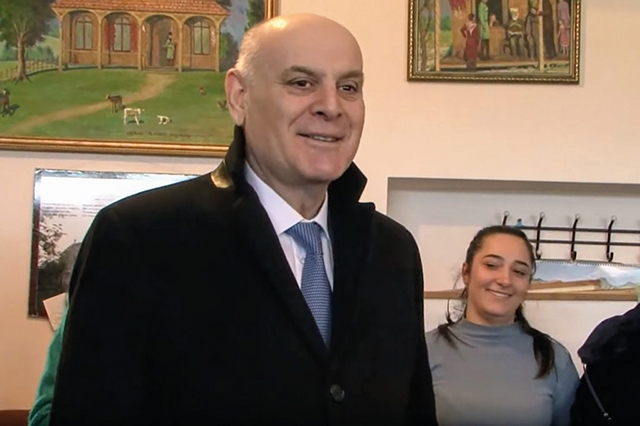“President” Bzhania: A New Era?
Op-ed
Occupied Abkhazia has a new de-facto leader, Aslan Bzhania, who has become the 5th so-called “president” of the breakaway region. During the second round of “elections,” Bzhania won a victory with 52,289 votes and, like all the other elections, this time too the Georgian population in Gali was the most active, exceeding 68% of total voters. 813 people from Gali voted for Bzhania, and support was perhaps even higher, but the majority of locals from Gali are deprived of their right to vote. The competitors have already congratulated the triumphant, which indicates an end to the Ochamchire “gang” that was the era of the previous leader Khajimba, and marks the return of the Gudauta “gang” to governance.
The day after his election, Bzhania nominated “ex-president” Alexander Anqvab for the post of “Chairman of the Government”. This means that Anqvab, AKA “Iron Alika,” who was practically overthrown some six years ago, reappears now as the “Prime Minister”. And considering the fact that Bzhania was the employer of Krasnodar’s FSB until 2012 and has only lived for eight years in Abkhazia, it is easy to guess who’s going to be the ruler of the occupied territory in reality. Anqvab is from Gudauta, a region regarded as the ideological pillar for the Abkhazian independence. Today, the major question in Abkhazia is how long the Bzhania – Anqvab government will last and whether it will mean continuing the trend of Abkhazia’s life of revolution to revolution.
Whatever the case, the Bzhania - Anqvab government still has a long way to go until the next potential revolution, as the winners are only just giving out their promises and discussing future plans. One of those plans is to start direct dialogue with Official Tbilisi, an initiative that Bzhania voiced after the first round of the elections. He raised the issue once again after winning the elections, stressing the importance of having an official platform, other than the Geneva format, where Sokhumi and Tbilisi can discuss ways to solve the current issues: “People face numerous problems, the vast majority of our citizens is unfortunately forced to cross the border in order to receive quality medical aid. It also happens that some commit crime on the Abkhazian territory and hide in Georgia, and vice-versa. We are also exploiting the Enguri Dam together. And this is an important level of contact,” Bzhania said.
Official Tbilisi has not responded to Bzhania’s initiative and, considering their statement issued on the Sokhumi “elections,” it can be stated with confidence that none of the Georgian governmental officials are planning to open a direct dialogue with Bzhania outside the Geneva format. Bzhania’s calculations are quite simple: to give an official status to those unofficial meetings in which the representatives of Official Tbilisi meet with the leaders of the de-facto government. For instance, the meetings on the problems surrounding the Enguri Dam and the more recent ones about coronavirus.
The pandemic has once again highlighted for Sokhumi the importance of direct negotiations with Official Tbilisi. Where, earlier, Sokhumi dictated the conditions of the negotiations, COVID-19 has turned everything around significantly. The recent meeting between Abkhazian and Georgian infectologists, where the Abkhazian doctors were given special protocols on the fight against the virus, took place following insistent demand from Sokhumi. International humanitarian organizations have so far delivered 500 pieces of personnel equipment, 600 liters of antiseptic products and 500 liters of antibacterial soap to Abkhazia via the Enguri Bridge. Moreover, it is planned to bring other medical equipment to occupied Abkhazia, but on one condition, which is that goods will be imported by international humanitarian organizations and the relations will be maintained with the breakaway region only via the Enguri Bridge.
The leadership team of Bzhania-Anqvab will perhaps bring the most evident change to the lives of Georgians in the Gali region. Khajimba’s governance was fighting by fire and sword against anything Georgian. Among them, it marked the closure of all Georgian schools. Locals were forbidden to learn anything in their native tongue and were deprived of the right to own property. Perhaps this is why Gali supported Bzhania, because he will change Khajimba’s legacy. As for Anqvab, sending him away from the government seven years ago was mainly due to him forming an alliance with the Gali population. From revolution to revolution, from coup to coup, this is how the political reality of occupied Abkhazia can be described to date. It will soon become clear whether Team Bzhania-Anqvab will change this tradition or not, as the coronavirus passes judgement not only on ordinary people, but on governments too.
By Zaza Jgarkava
Image source: Apsny Today












